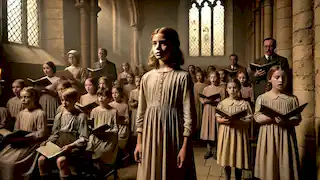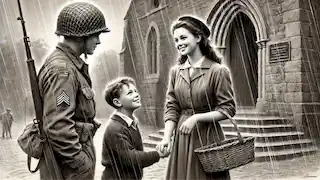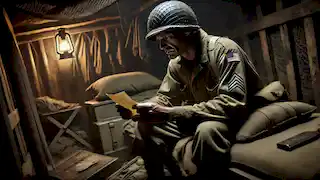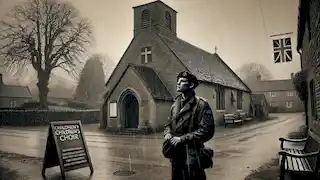It was a rainy, dismal April afternoon in 1944 when I first met Esmé. I had been stationed in Devon, England, for a brief respite before embarking on a mission across the Channel. The war was like a shadow in those days, looming over everything, pressing down on all of us with its dark weight. People went about their lives, but there was always a sense of heaviness in the air, an awareness that at any moment, the world could collapse around us.
I had spent the day wandering through the small English town, not really sure what I was looking for, but knowing that I needed some kind of escape, even if just for an hour or two. It was then, by chance, that I stumbled upon a small church. Outside, a sign advertised that a children's choir would be performing inside that afternoon. With little else to do and the rain falling steadily now, I went inside.
The church was quiet, dimly lit, and nearly empty. A few people sat scattered in the pews, and I found a seat toward the back, feeling almost embarrassed by my presence there. I had no connection to this place, no ties to the people singing. But there was something peaceful about the stillness, the sense that, in this small sanctuary, the war could not touch us, even if only for a short while.
The choir began to sing—a sweet, haunting melody that echoed through the high, vaulted ceilings of the church. It was beautiful, and for a moment, I let myself forget everything outside. My eyes wandered toward the front, where the children were gathered. There, in the midst of them, I noticed her.
She was a young girl, no older than thirteen or fourteen, with strikingly intelligent eyes and an air of calm about her that seemed beyond her years. Her hair was neatly tied back, and she stood with perfect posture, her eyes focused on the conductor. She didn’t fidget or glance around like the other children. She seemed wholly absorbed in the music.

After the performance, I lingered in the back of the church, unsure why. Perhaps I was waiting for something, though I didn’t know what. The children filed out, talking and laughing among themselves. The girl I had noticed earlier walked out slowly, her eyes downcast, deep in thought. Something compelled me to follow.
Outside, the rain had lessened to a soft drizzle, and I found her standing under the church’s small awning, waiting, I presumed, for someone to come and take her home. I approached her cautiously, not wanting to startle her.
“Lovely performance,” I said, offering a tentative smile. She looked up at me, startled at first, but then her expression softened into one of polite curiosity.
“Thank you,” she said, her voice steady, though it had the high, clear quality of youth. “I rather enjoyed singing today.”
There was a pause as we both stood there in the fading light of the afternoon, the sound of the rain softening around us.
“My name is Esmé,” she said finally, extending her hand with the same formality one might expect from an adult.
I took her hand and introduced myself, feeling slightly absurd at the solemnity of it all. Here I was, a grown man, introducing myself to a child as though we were meeting at a formal dinner. But Esmé had an air of seriousness about her that made it seem appropriate.
“I noticed you were quite absorbed in the music,” I said, attempting to strike up a conversation. “Do you enjoy singing?”
“I do,” she said with a nod. “I’ve been told I have a talent for it. I suppose I take it quite seriously.”
She spoke with an unusual maturity for her age, and there was something about her that intrigued me. She wasn’t like the other children I had known, the ones whose laughter and energy seemed boundless. Esmé was composed, thoughtful, almost grave. But there was a warmth beneath the surface, a kindness that made her presence calming rather than intimidating.
We stood there talking for some time, about music, about books—subjects that I was surprised she had such a deep knowledge of. She was well-read for someone so young, and she had a keen interest in the world around her, though she viewed it with a kind of quiet skepticism that I found both endearing and slightly sad.
As we spoke, her younger brother, Charles, ran out of the church, his face flushed with the excitement of having been released from the confines of the building. He was a lively boy, full of energy, and he immediately began tugging at Esmé’s hand, asking her to come home.
Esmé introduced me to Charles, who was far more eager to chat than his sister. He bombarded me with questions about the war, about being a soldier, about whether I had ever flown in an airplane. His enthusiasm was infectious, and for a few moments, I forgot about the heaviness that had been weighing on me for so long.
Eventually, Esmé and Charles had to leave, and we said our goodbyes. But before she went, Esmé turned to me and, with that same air of quiet dignity, said, “I hope you will stay well through the war. I hope you won’t be killed.”
Her words, delivered so simply and sincerely, left me momentarily speechless. There was no fear in her voice, no sense of panic. It was as if she were wishing me well on a simple journey, one with a clear beginning and end. But of course, the war was anything but simple, and the possibility of death loomed over all of us.
“I’ll do my best,” I replied, offering a small smile. It was all I could say, knowing that I could make no promises.
We parted ways, and as I watched her and Charles walk away, I felt an inexplicable sense of loss. I had only just met her, but there was something about Esmé that had left a lasting impression on me. She was different, not in a way that could be easily explained, but in a way that made me feel as though I had encountered someone rare and precious in the midst of the chaos of war.
Months passed, and I was sent to the front lines. The war became my world, and the days bled into one another in a haze of exhaustion, fear, and death. I saw things that no one should ever have to see, things that haunted my dreams long after the fighting was over.
It was during one of those long, dark nights, huddled in a makeshift shelter with my fellow soldiers, that I thought of Esmé again. I remembered her calm, steady gaze, the way she had wished me well with such quiet certainty. It was a small memory, but it brought me a moment of peace in the midst of the horror.
After the war ended, I returned to England for a brief period before being sent home. I had changed—there was no doubt about that. The war had left its mark on me, not just physically, but mentally. I felt hollow, as though some essential part of me had been lost in the trenches, never to be recovered.
It was during this time that I received a letter. The handwriting was neat, precise, and unfamiliar. I opened it, and to my surprise, it was from Esmé.

She had written to me, asking how I was, whether I had survived the war. Her words were kind, but there was also a certain formality to them, a sense that she was trying to maintain a distance, even in her concern. She mentioned Charles briefly, saying that he had missed me and often asked about the American soldier they had met outside the church.
But it was the end of the letter that struck me the most. Esmé wrote, “I hope that the war has not left you damaged. I hope you are still yourself, or at least as much of yourself as one can be after such a thing.”
Her words echoed in my mind for days after. I wasn’t sure if I was still myself. I wasn’t sure who I was anymore. The war had changed everything, and I wasn’t certain that I would ever find my way back to the person I had been before.
The years passed, and life moved on, as it always does. I returned to America, tried to rebuild some semblance of a normal life, but there was always a part of me that felt disconnected, as though I were watching the world from a distance, unable to fully engage with it.
Every now and then, I thought of Esmé. I wondered what had become of her, whether she had grown into the remarkable woman I had always known she would be. I wondered if she remembered me, if our brief meeting had meant as much to her as it had to me.
It wasn’t until many years later that I found myself back in England, purely by chance. I hadn’t planned to return, but something about the place still called to me, even after all those years. I visited the small town where I had first met Esmé, walking through the familiar streets, though everything seemed different now, touched by the passage of time.
I didn’t expect to see her again. I assumed she had moved on, that she had grown up and left this place behind, just as I had. But as I wandered through the town, I saw her.

She was standing outside the same church where we had first met, though she was no longer the child I remembered. She was a young woman now, poised and elegant, but there was still that same air of calm about her, that same sense of quiet strength.
Our eyes met, and for a moment, I wasn’t sure if she recognized me
. But then she smiled—a small, knowing smile—and I knew that she remembered.
We spoke briefly, catching up on the years that had passed. She had become a teacher, she told me, working with children much like the ones who had sung in the choir all those years ago. She spoke with the same maturity and thoughtfulness that had always set her apart, though there was a lightness to her now, a sense that she had found her place in the world.
As we parted ways once again, I realized that meeting Esmé had been one of the few bright spots in an otherwise dark time of my life. She had given me a sense of peace, of hope, when I had needed it most, and for that, I would always be grateful.
I never saw Esmé again after that, but I thought of her often. In a world that had been torn apart by war, she had been a beacon of light, a reminder that there was still goodness and kindness to be found, even in the darkest of times.
I kept her letters, though I never wrote back. It seemed unnecessary, somehow, to put into words what she had already given me—a sense of peace, a moment of grace in the midst of chaos.
And in the end, that was enough.

.)



















